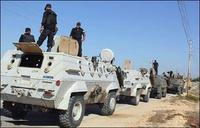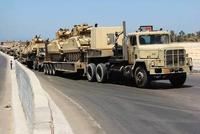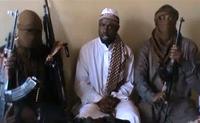-
Lawmakers, scientists question FBI’s investigation, conclusion in 2001 anthrax attacks

Twelve years after the fall 2001 anthrax attacks, and six years after the 2007 FBI’s determination that Bruce Ivins, a top government anthrax researcher at the U.S. Army Medical Research Institute of Infectious Diseases (USAMRIID), was the perpetrator of the attacks (Ivins died in 2008 of apparent suicide), lawmakers and USAMRIID scientists insist that the FBI’s conclusions are not supported by scientific evidence – indeed, that some basic scientific facts make the Bureau’s conclusions untenable.
-
-
U.S. nuclear facilities vulnerable to terrorist attack: study

Some U.S. nuclear facilities are inadequately protected against theft of weapons-grade materials and sabotage by terrorists. Terrorist attacks on vulnerable nuclear facilities could trigger a meltdown or lead to a diversion of bomb-grade uranium. The danger is far from hypothetical since the 9/11 hijackers are known to have considered flying a passenger jet into a U.S. nuclear reactor before they settled on the World Trade Center as their main terror target.
-
-
Israel, Egypt escalate attacks on militants in Sinai Peninsula (updated)

The growing intelligence cooperation between Egypt and Israel was in evidence early Friday when the Israel Air Force (IAF), in coordination with the Egyptian military, used drone strikes to destroy ready-to-launch rockets and rocket launchers on Egyptian territory, killing five Egyptian militants in the process. The rockets were deployed on Thursday in a desert area near the town of Rafah, and were discovered by an Egyptian surveillance fly-over. On Saturday, the Egyptian air force attacked militant positions in the area, killing twelve Islamists.
-
-
Deteriorating Sinai Peninsula security situation poses problems for Israel, Egypt

The attacks on Islamist targets in northern Sinai — by Israel on Friday and by Egypt on Saturday — are but the latest evidence of a growing problem of militancy and terrorism in the Sinai Peninsula, a vast, hard-to-control, lightly populated area consisting of steep mountain ranges and a forbidding desert. The growing al Qaeda presence in the area, the continuing influence of Iranian arms smuggling networks, and the influx of foreign Jihadists make the deteriorating security situation in the peninsula a threat both to Israel and to Egypt. The stipulations of the 1982 Egypt-Israel peace treaty complicate to fight against the militants.
-
-
Israeli drone strike, in coordination with Egypt, destroys militants’ rockets deployed on Egyptian territory
The growing intelligence cooperation between Egypt and Israel was in evidence earlier today (Friday) when the Israel Air Force (IAF), in coordination with the Egyptian military, used drone strikes to destroy ready-to-launch rockets and rocket launchers on Egyptian territory, killing five Egyptian militants in the process. The rockets were deployed on Thursday in a desert area near the town of Rafah, and were discovered by an Egyptian surveillance fly-over.
-
-
Obama administration renews drone campaign in Yemen
Responding to intelligence information about planned terrorist attacks by Al Qaeda in the Arabian Peninsula (AQAP), information which led to the closure of twenty-two U.S. embassies in the Middle East and North Africa and a travel warning issued by the Department of State, the Obama administration has launched a series of drone strikes in Yemen over the past ten days.
-
-
Govt.: lawyer jailed for helping imprisoned terrorist not entitled to medical early release

The government told U.S. District Judge John Koeltl that he does not have the authority to release an ailing disbarred civil rights lawyer who is currently serving a 10-year prison sentence for allowing a imprisoned Egyptian sheik to communicate with his followers. Lynne Stewart, 73, is suffering a recurrence of her breast cancer, but the government says that she is not telling the truth when she says she has only eighteen months to live.
-
-
First charges filed in Benghazi attack
Eleven months after the attack, U.S. federal officials have filed the first charges in the attack on the U.S. consulate in Benghazi, Libya on 11 September 2012. Among those charged is Ahmed Abu Khattala, a prominent Libyan militia leader. Others named as defendants were not disclosed. The charges initially were sought in New York months ago, and are still under seal. Attorney General Eric Holder had promised congressional leaders earlier this year that the Justice Department would soon publicize the action the Justice Department would be taking.
-
-
Boko Haram leader deposed following cease-fire agreement with Nigerian government

Sheikh Abubakar Shekau, the leader of Nigeria’s Boko Haram, appears to have been deposed by more moderate members of the Islamic group. The change of leadership follows a cease-fire agreement between the Islamic organization and the Nigerian government, reached in talks on 25-26 June. Violence has continued however, and Boko Haram, which since 2009 has been conducting an increasingly violent campaign against the Nigerian government and Western influence in the country, may split as more radical elements decide to create a new militia.
-
-
Interpol issues global alert following nine al Qaeda-linked prison breakouts
Interpol, in a statement issued from the organization’s headquarters in Lyon, France, urged law enforcement agencies around the world to show “increased vigilance,” following prison breakouts over the past nine month in nine countries, including Iraq (22 July), Libya (27 July), and Pakistan (31 July). More than 2,500 terrorists have escaped in these nine prison breakouts.
-
-
FBI terrorism unit investigates animal rights group after pheasant farm attack

An FBI Joint Terrorism Task Force has launched an investigating after an animal rights group announced on its Web site that its members cut open fencing around a and releasing more than a dozen pheasants from the aviary at Ash Grove Pheasant Farm and Orchard in Riverside, California. The incident took place 22 July.
-
-
U.S. closes 21 embassies, issues travel alert following “credible” al Qaeda threat
The U.S. State Department issued a travel alert Friday warning al Qaeda may launch attacks in the Middle East, North Africa, and several other places. The department also closed twenty-one embassies and consulates this weekend. “Current information suggests that Al Qaeda and affiliated organizations continue to plan terrorist attacks both in the region and beyond, and that they may focus efforts to conduct attacks in the period between now and the end of August,” the State Department said in a statement.
-
-
Two Chicago terrorism cases bring the issue of expanded surveillance to the fore
A Chicago attorney representing a teenager facing terrorism charges raised concerns during a pre-trial hearing about whether expanded surveillance methods were used in her client’s case. This is the second time in less than a month that the issue of expanded surveillance methods was brought up in a Chicago terrorism case.
-
-
Details of al Qaeda’s “next generation” bomb, aborted effort to take out its designer, emerge
Al Qaeda engineers have been working on designing a sophisticated bomb powerful enough to bring down passenger planes but which is designed to avoid detection by explosives detection machines or trained dogs at airports. “All of our explosive detection equipment wasn’t calibrated to detect [this type of bomb]” TSA director John Pistole said. “And all of our 800 bomb-sniffing dogs had not been trained for that specific type.” A CIA informant inside a Yemeni cell of al Qaeda volunteered to place the bomb on a U.S.-bound plane, but instead delivered it to his CIA handlers in Saudi Arabia. A CIA effort to learn more about the bomb maker, Ibrahim Hassan Asiri, and take him out was aborted when someone leaked the story to AP. The news service refused pleas by the administration to postpone publication of the story until the end of the operation. The AP did agree to delay publication by a week to ten days to allow the CIA to extricate the agent and his family from Saudi Arabia to safety before publication. Asiri and his bomb-making assistants are still at large.
-
-
Ukrainian man in U.K. court charged with anti-Muslim terrorism
Pavlo Lapshyn, a 25-year-old postgraduate student from Dnipropetrovsk, Ukraine, appeared in a Westminster, U.K. court Tuesday and charged with the terror-related April murder of an 82-year-old Mohammed Saleem as Saleem was walking home from a mosque. Lapshyn has also been charged with three additional offenses related to three explosions near mosques in Walsall, Wolverhampton, and Tipton.
-
- All
- Regional
- Water
- Biometrics
- Borders/Immig
- Business
- Cybersecurity
- Detection
- Disasters
- Government
- Infrastructure
- International
- Public health
- Public Safety
- Communication interoperabillity
- Emergency services
- Emergency medical services
- Fire
- First response
- IEDs
- Law Enforcement
- Law Enforcement Technology
- Military technology
- Nonlethal weapons
- Nuclear weapons
- Personal protection equipment
- Police
- Notification /alert systems
- Situational awareness
- Weapons systems
- Sci-Tech
- Sector Reports
- Surveillance
- Transportation
Advertising & Marketing: advertise@newswirepubs.com
Editorial: editor@newswirepubs.com
General: info@newswirepubs.com
2010-2011 © News Wire Publications, LLC News Wire Publications, LLC
220 Old Country Road | Suite 200 | Mineola | New York | 11501
Permissions and Policies
Editorial: editor@newswirepubs.com
General: info@newswirepubs.com
2010-2011 © News Wire Publications, LLC News Wire Publications, LLC
220 Old Country Road | Suite 200 | Mineola | New York | 11501
Permissions and Policies
